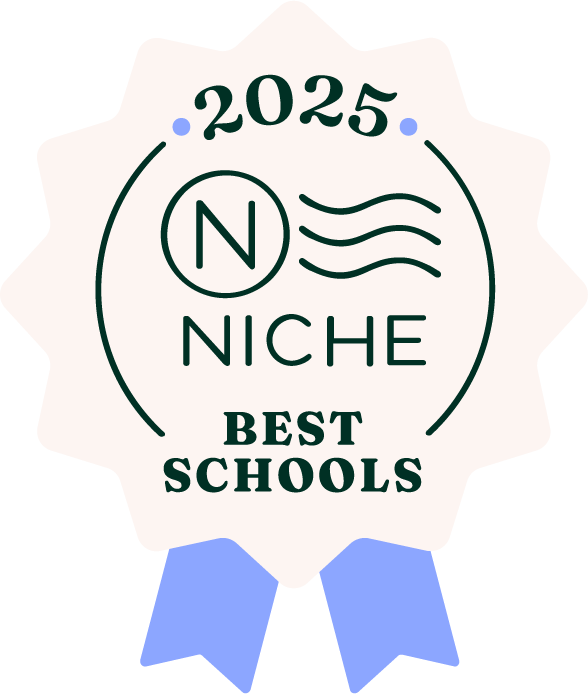We recently sat down with Upper School Faculty member, Jonathan McLean, to learn more about Greensboro Montessori School's Junior High Music Ensemble. Here's an edited transcript of our conversation.
Q: What exactly is Music Ensemble?
A: We have a lot of students who want to play a lot of different things or perform a lot of different [types] of music ... anyone from somebody taking violin, to taking piano, to taking singing lessons, to just hanging out at home banging around on the piano. To follow the child - and the best thing for each child - I've found is the Music Ensemble, which is just a big band.
Q: Is Music Ensemble part of students' regular coursework, or is it an elective?
A: The closest thing it's to is an elective. Certain people are required to be in it. If [a student is in] my Creative Labs class and they are always [applying] for positions for composers or being in the band, then yes, it's a requirement they have to be in Music Ensemble. They give up one of their independent studies, which makes it like an elective, and come in [the studio] and rehearse.
Q: How often do you rehearse?
A: One class block every week, which is an hour and fifteen minutes, which is barely enough. But it is Wednesdays. We loose [lots of Fridays and Mondays] every year for [teacher workdays] and national holidays. That's why I put it on Wednesday, so we lose fewer of them. We also have dress rehearsals and sound check rehearsals before any show, [which would] be on a Saturday or Sunday usually, or right after school.
Q: Who can participate in Music Ensemble?
A: Anybody that's already had at least a year’s worth of lessons on a instrument, because Music Ensemble is not for me to teach you how to play an instrument. Creative Labs, actually, is [when] I can spend some time showing a student some stuff about how to play an instrument and then get a student hooked up with an after-school or out-of-school teacher. [Music Ensemble] is an advanced music experience, and the student needs to have already made a commitment to learning an instrument. Vocalists are taking voice lessons, and some have also taken lessons on piano.
Q: Are your vocalists also taking voice lessons?
A: One, two, three. Three of them are. One of them is not. Two of them have taken lessons on piano and have switched to vocals. Once you learn an instrument, particularly piano (because if you go off to music school everybody has to take Piano 101, it's like English Composition 101 to be a writer), you can play pretty much anything.
Q: What is the age range of your current Music Ensemble?
A: 12 through 15, [but we currently have a guest drummer] who is in fifth grade. The [typical] grades are seventh to ninth ... I invited him [to join] for two reasons. One, he's a student of mine, and he's highly advanced for his age. He could play in any band and make money right now if he wanted to. He practices with me once per week and also at home. [Two,] all my drummers graduated. It was an advantageous moment.
Q: What is the single greatest lesson your students take away from working in Music Ensemble?
A: That’s easy. Working in a band is working in a group. When you do group projects in the classroom, how do you assess how much each person is carrying their weight if it's an outside project? We don't know how to do that right now. In class though, it's a little easier ... but in a band, if you are not carrying your weight, everybody knows it. There is no calling somebody out and being unfair and them saying, "No, I know my part." No, you don't, because we have to stop because [someone's] part is wrong, and I don't mean that in a harsh way, it's just one for one, like math. It's either right or wrong. It's either in tune, on rhythm and in the right spot, or it's not. That's the single most important lesson: you cannot hide in a group.
Q: How long have you been teaching Music Ensemble?
A: Music was one of the first things I did when I got to Greensboro Montessori School [in 2002]. The middle schoolers were revolting against the traditional class where students are learning music on recorders playing from the same book I used when I was in Junior High. You have to do something current for adolescents to get engaged. So when you immediately say the word “band,” they want to play.
Q: What have you learned teaching Music Ensemble?
A: The first lesson I learned was the drawback to individual lessons. I think that all people who [teach] individual lessons should have some sort of network where they get their students together to play in an ensemble or a band. I would get a full band together [at Greensboro Montessori School] and each student may have had 2 to 3 years of lessons on their given instrument, and we'd start the song, and we'd play through it, and it would just be cacophonous and terrible. If you just pulled [each musician] out magically and just listened to them, they would nail the song, but they had been taught in a vacuum. As long [as a student thinks they're] playing the song correctly, they're not even tuning in to the other members of the group. So that goes back to the step above learning to work in a group. One, you can tell who is not carrying their weight, but two, its awful, its not pleasant. To teach you to tune into that goes into all the other stuff about brain development and mathematics and what music does to your brain.
Q: What do students new to Music Ensemble need to learn?
A: They need to start listening to each other. It is self awareness and it's being aware of other people, and doing that thing Miles Davis said where everybody pushes and pulls each other. If somebody's lagging behind, it may be because they are having a hard time with a song, so the band has to tune into it, be a team, and slow down a little bit. You can get on them afterwards, like "why were you playing that so slow," but [during] a performance you support your team. But also, it may be, as they get the hang of it, somebody wants to pull the song back, and that sets the mood. Maybe someone wants to push it a little bit, but that's how musicians interact with each other.
Q: What is the most important thing you see your students do in Music Ensemble?
A: All the brain development that goes on after they learn the basics of working in a group, then to listen to each other, and then to get into it [with each other]. What I know as a performer and an entertainer is if you only have one person or 10000 people watching you, if the audience sees that [members of the band are] just up there doing [their] individual jobs, it's going to be apparent to the audience. And even if [the music] is in tune and played well, it doesn’t come together. There is a gestalt that happens when you are into your music, and I think thats the hardest thing to teach the kids to do, because at this age, kids get freaked out when they think people are watching them, and you know what I've learned from sports, it's not their parents watching them. It's their peers. That’s one of their biggest challenges they have - to perform. They don’t want to be awkward, they don’t want to play badly, they don’t want to seem stiff in front of their friends ... which actually, usually causes them to stiffen up.
Q: And where they are as adolescents, that’s an important factor to them, is what their peers think of them?
A: It is at the top of the list according to the best brain research and social and emotional research we have. They literally feel like they're going to die when they're not around their friends. So when their friends are in front of them, they cannot “mess up” in front of them. It's enormous pressure. That's a whole thing that doesn't even affect me. You know, I get nervous before I play, but once I start playing, I settle in. But these guys, that’s a real developmental thing for them to settle into that [and to learn to work through that pressure]. It will hopefully pay off when they get in front of people to present as an individual. Even if [these students] don't go on to be musicians, they will continue to feel comfortable ... presenting themselves, whether its for a college application, a job application, or giving a speech.
Q: As we wrap up our interview, do you have any final thoughts?
A: I am proud of fighting [for music and the arts] as an equal subject to math, science, and language, and I have teammates that have always supported me on that. Now I have a subject called Creative Labs which happens to be music, art, design, and anything like that, but that’s where the 21st century skills are going ... Every day you're getting music and every day you're getting art, which is what the [students] get here. It is equal across the board, but it does take a team that supports that and realizes that. I think that's something vitally different that we do here at Greensboro Montessori School.


